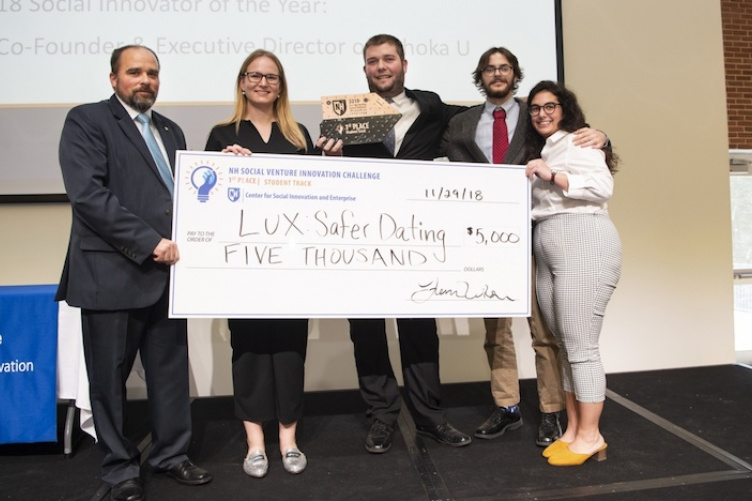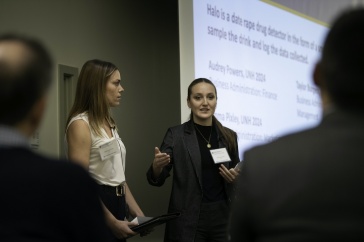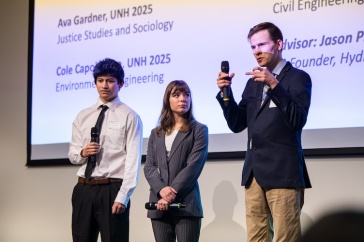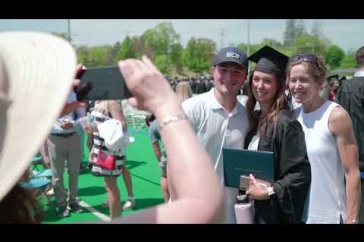
(L to R) Alan Brown, Kennebunk Savings; LUX team members: seniors Christin Badylak-Reals, Sean McLoud, Mark Torpey and Julie Berberian.
A team of mechanical engineering majors who decided to tackle the hard issue of sexual assault took first place in the student track of the sixth annual NH Social Venture Innovation Challenge (SVIC) for their dating app, LUX: Safer Dating. Winners were announced Nov. 29.
Seniors Christin Badylak-Reals, Sean McLoud, Julie Berberian and Mark Torpey developed the dating app, which uses wearable technology and location tracking to mitigate dating sexual violence. The group was one of 16 out of 95 teams to make it to the finals. SVIC is a business plan competition that has entrants sharing their ideas on how to solve some of the most pressing issues facing society today. Winners share more than $50,000 worth of cash prizes and services.
“We know that effective solutions to society’s most insidious problems will increasingly need to come from collaboration across private and public sectors, and across fields and discipline.”
Badylak-Reals took the concept of LUX to her “Intellectual Property and Asset Management” class, which her three teammates were also taking, and it grew from there.
“I had been working on the idea for a while; I always knew it was going to be a dating app but didn’t know how it was going to work,” Badylak-Reals says. “I took the idea to the class and proposed it as our business project, and we started talking about what we had to go through to get it off the ground.”
The concept was forged around wearable technology that would allow a user to discreetly call for help in an unsafe situation. The group is in contact with a tech jewelry company.
“It could work by pressing a ring, a smart watch, a pendant,” Badylak-Reals says. “It’s a way to call for help without alerting the person you’re with."
McLoud helped Badylak-Reals present LUX to the SVIC panel of judges.
“We are blown away that we received first place in the challenge because every other competitor there was simply amazing,” McLoud says. “It was a pleasure seeing their innovation and passion for what they were doing. We are super excited for the future of LUX.”
The team plans to use the $5,000 prize to continue the development of the app.
Second prize in the student track went to True Vote, a mobile and web application that would enable voter participation on a daily basis as well as encourage politician accountability, was proposed by UNH student Elizabeth O'Malley ’19, an economics and international affairs major.
The third-place prize was shared by anthropology major Sarah Jarrar ’21, whose proposed Janas Analytics software would be one of the first proactive solutions to predicting global migrant crises, and the Potential for Leaf Waste, an idea for an on-campus leaf and food waste composting system at Colby-Sawyer College. Team members included Colby-Sawyer environmental science students Rebecca Budrock, Anna Hubbard, Cameron Lynch, Colby Reardon and Timothy Gablosky.
“We know that effective solutions to society’s most insidious problems will increasingly need to come from collaboration across private and public sectors, and across fields and discipline,” says Fiona Wilson, executive director of UNH's Center for Social Innovation and Enterprise. “This challenge not only encourages that type of innovation, but shows what it can accomplish.”
The statewide competition also includes a community track, won this year by Milford residents Devon Crawford ’18 and Jack Nichols. Their idea for TheHive, an independent quick-deploy network accessible by any Wi-Fi enabled device, would allow users to communicate with emergency crews and family during natural disasters. UNH Fish Feed NH, which utilizes aquaculture to support NH's food insecure, took second place. Team members included UNH alumna Eileen Liponis ’95G and Jayson McCarter, Paul Morrison, Moriar Webster and Maddy Webster, all of Manchester, New Hampshire. The third prize winner was Growing Hope, a U.S.-based organization that supplies portable milk crate garden boxes to South Sudanese refugees in the Bidi Bidi camp. The project was proposed by Emanne Khan of Concord, New Hampshire, Abigail Wilding of Bedford, New Hampshire, and Sarah Mullins of Contoocook, New Hampshire.
Ian Grant, executive director of UNH ECenter, served as advisor for the first-place winners in both groups.
The SVIC is organized by the Center for Social Innovation & Enterprise, and co-hosted by the Carsey School of Public Policy, Peter T. Paul College of Business & Economics, UNH’s Sustainability Institute, Net Impact UNH and Enactus UNH.
-
Written By:
Jody Record ’95 | Communications and Public Affairs | jody.record@unh.edu


















































